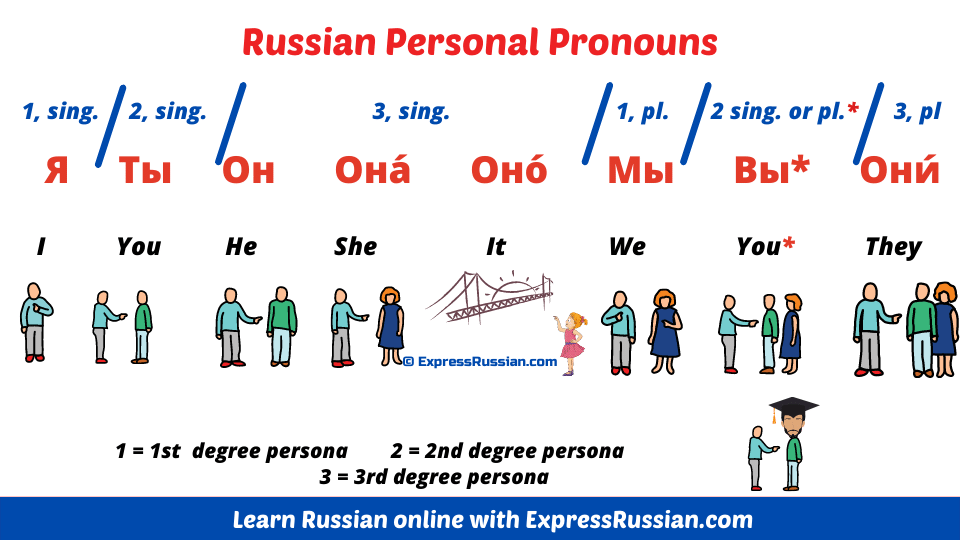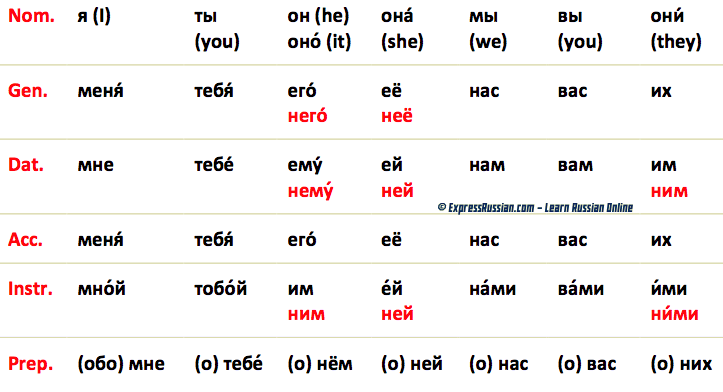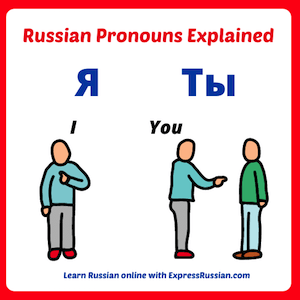In this article:
What is a pronoun?
A pronoun is a part of speech that indicates an object, features or quantities, but does not name them.
Pronouns answer the questions Кто? (Who?), Что? (What?), Какой? (Which one?), Сколько? (How many?), Чей? (Whose?) etc
Types of Russian Pronouns
According to their meaning and grammatical features, Russian pronouns are divided into several categories:
- personal
- reflexive
- possessive
- demonstrative
- interrogative
- negative
- attributive
- indefinite pronouns.
Let’s look at each category in detail and see how these pronouns differ from each other and which meanings they express!
Personal Pronouns in Russian
Russian Personal Pronouns are:
я (I), ты (you), он (he), она́ (she), оно́ (it), мы (we), вы (you), они́ (they)

Russian pronoun ВЫ (YOU) formal
In Russian, there is a distinction for addressing one’s conversation partner or partners depending on the levels of politeness.
Difference between Russian pronouns ТЫ and ВЫ (YOU formal)
One would use ВЫ instead of ТЫ for speaking to an older person, one’s superior or colleague or anyone they are not familiar with or need to keep “the distance”.
The conjugation follows as well, all the forms of verbs will turn into plural, although we speak about a single person, not a group of people. Example:
Вы хотите сесть? VS Ты хочешь сесть?
Do you want to sit down?
Здравствуйте, Иван Иванович! VS Здравствуй, Ира!
Hello, (Name).
Вы готовы заказывать? VS Ты готов заказывать?
Are you ready to order?
Вы уже решили, куда поедете в отпуск? VS Ты уже решил, куда поедешь в отпуск?
Have you decided where you’ll go for your vacation?
In English this distinction is already lost, however, in many languages, like French, Italian, and Spanish it is still present.
Russian pronoun ВЫ (YOU) plural
Pronoun ВЫ in Russian is used for all situations where you speak about a group of people (more than 1 person). All the conjugations (for example, verbs in past tense, verbs in future tense, and adjective endings) are kept in plural forms.
All Russian personal pronouns conjugate in number and case, and additionally – in gender (only 3rdpersona sing. он, она́, оно́)

Note: after prepositions (like “y”, “возле”, “c”, “к”, “о” etc), pronouns of 3rdpersona singular and plural (он, она́, оно́, они́) acquire letter н: у него́ (he has…),у неё (she has…), к ней (to her), к нему́ (to him), за ней (for her), ме́жду ни́ми (between them), о́коло них (near them).
Reflexive pronoun in Russian
There is only 1 reflexive pronoun in Russian:
себя́ (= itself, himself, herself).
Below is its conjugation chart by cases:
| Nom.case | – |
| Gen.case | себя́ |
| Dat.case | себе́ |
| Acc.case | себя́ |
| Inst.case | собо́й |
| Prep.case | (о) себе́ |
(Gen.) Де́ти хорошо́ вели́ себя́ в теа́тре. – Children behaved (themselves) well in the theater.
(Dat.) Я купи́л себе́ блокно́т. – I bought myself a notebook.
(Acc.) Я себя́ не узнаю́. – I don’t recognize myself.
(Inst.) Я беру́ с собо́й рюкза́к в пое́здку.- I take my backpack with me on my trip.
(Prep.) Я рассказа́л о себе́ всё. – I told everything about myself.
Related: Russian Cases
Possessive pronouns in Russian
мой (mine), твой (your), ваш (your), наш (our), свой (someone’s own), его́ (his), её (her), их (their)
indicate to which person the object belongs.
Possessive pronouns мой (mine), твой (your), ваш (your), наш (our), свой (own) conjugate like adjectives – by cases, numbers and gender.
Related: Russian Possessive Pronouns – Conjugation table
You will also like: What’s the difference between мой (mine) and свой (someone’s own)
Demonstrative pronouns in Russian
Demonstrative pronouns are pronouns that point to specific objects, features or quantity. They take the place of a noun, noun phrase, activity, or situation.
Russian demonstrative pronouns:
тот (that), э́тот (this), тако́й (this kind), тако́в (this kind), сто́лько (that much)
conjugate like adjectives – by cases, numbers and gender.
Interrogative (question-like) pronouns in Russian
Russian interrogative pronouns:
кто (who), что (what), ско́лько (how much), како́й (which/ what kind), чей (whose), кото́рый (the one that)
serve to ask a question about an object, a feature or quantity.
Negative pronouns in Russian
Russian negative pronouns:
никто́ (nobody), ничто́ (nothing), никако́й (not any one, no one), ниче́й (no-one’s), не́кого (no-one), не́чего (nothing)
serve to deny the presence of an object, a feature, quantity, or to strengthen the negative meaning of the whole sentence.
They are formed from interrogative pronouns with the help of
– unstressed prefix ни- никто́ (nobody), ничто́ (nothing), никако́й (not any one, no one), ниче́й (no-one’s)
– stressed prefix нé- не́кого (no-one), не́чего (nothing).
Attributive pronouns in Russian
Russian attributive pronouns:
весь (all, entire), вся́кий (every), ка́ждый (everyone), сам (myself/himself), са́мый (the one), ино́й (some other), друго́й (other)
indicate an item from several similar items or generalize items.
Pronoun сам (myself/himself) indicate a person who is going to do the action all my himself.
Я сам всё сдéлаю. – I will do all by myself (man speaking)
Я самá всё сдéлаю. – I will do all by myself (woman speaking)
Всё само заживёт. – Everything will heal by itself (neuter).
Pronouns весь (all, whole), вся́кий (everyone, anyone) indicate the subject as something inseparable from the rest.
Я работал весь день без перерыва.- I worked all day without interruption.
Все о́чень уста́ли. – Everyone was very tired.
Всю неделю шёл дождь. – It rained whole week.
Related: Russian Reflexive Verbs
Indefinite pronouns in Russian
Indefinite pronouns indicate undefined qualities, persons or quantities.
In Russian, negative pronouns are:
не́кто (someone unknown),
не́что (something unknown),
не́который (some person),
не́сколько (some quantity/several),
кое-кто́ (someone unknown),
кое-что́ (something unknown),
кто́-либо (anyone), кто́-нибудь (anyone),
кое-како́й (some, any), како́й-то (some, any),
како́й-либо (some, any), како́й-нибудь (some, any),
ско́лько-то (some, any), ско́лько-нибудь (some, any).
They are formed from Interrogative (question-like) pronouns by adding
–prefix не-: не́кто (someone unknown), не́что (something unknown)
–prefix кое-: кое-каки́е (some type of),кое-что́ (something unknown)
– suffixes -то, -либо, -нибудь: кто́-то (someone), кто́-либо (anyone), кто́-нибудь(anyone)
Most of indefinite pronouns belong to intermediate and even advanced level of Russian. As you see, they are translated into English as either “some” or “any” indicating an unknown person, quantity or quality. As you progress with your Russian, their sense will get more and more clear to you. We advise you to explore them one by one via a dictionary to understand small nuances in meaning.
Are you interested to know more about Russian pronouns and have the conjugation charts of all Russian pronouns with plenty of examples in the context? Join the self-paced course “Russian Grammar Made Easy” and learn Russian anytime, anywhere with ease!
The course covers all the basic rules of Russian grammar explained in a simple way accompanied by everyday conversational Russian phrases.
SEE THE FULL PROGRAM BELOW:
- Russian alphabet and pronunciation
- Gender of nouns. Plural of nouns.
- Introduction into Russian cases.
- Russian verbs: aspect and tenses
- Present tense of verbs. Conjugation of verbs.
- Russian Past tense.
- Russian Future tense.
- Russian sentence structure. Word order. Negative form. Question form.
- Adjectives. List of the most common Russian adjectives and their conjugation.
- Russian pronouns.



6 replies on “Russian Pronouns – The Number 1 Guide into Pronouns in Russian”
[…] You can learn more about these and other pronouns in the article Russian Pronouns. […]
[…] Related: Russian Pronouns – Full List […]
[…] can reinforce the reflexivity by additional reflexive pronouns, such as: сам, сам себя, самому себе – itself, с самим […]
[…] Related: Russian Pronouns – The Ultimate Guide […]
[…] The Ultimate Guide to Russian Pronouns […]
This helps a lot! I recommend everyone who is learning Russian to read and save this. It is really useful and clear. Even much better than my teacher.
Anyways, I learn Russian with Duolingo. But Duolingo is not very direct and clear – sometimes makes me confused. So I use this with Duolingo, they are great together.
🙂